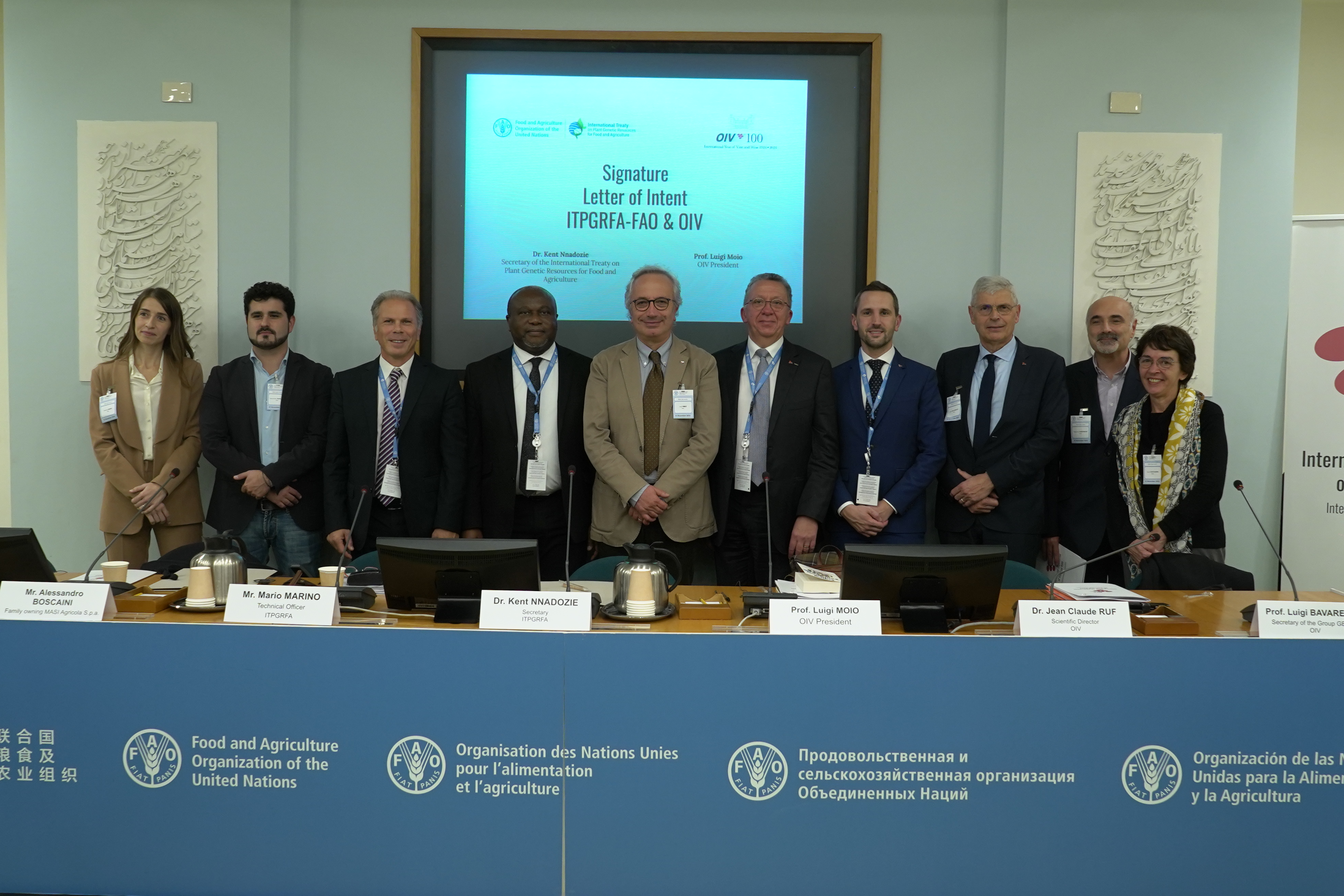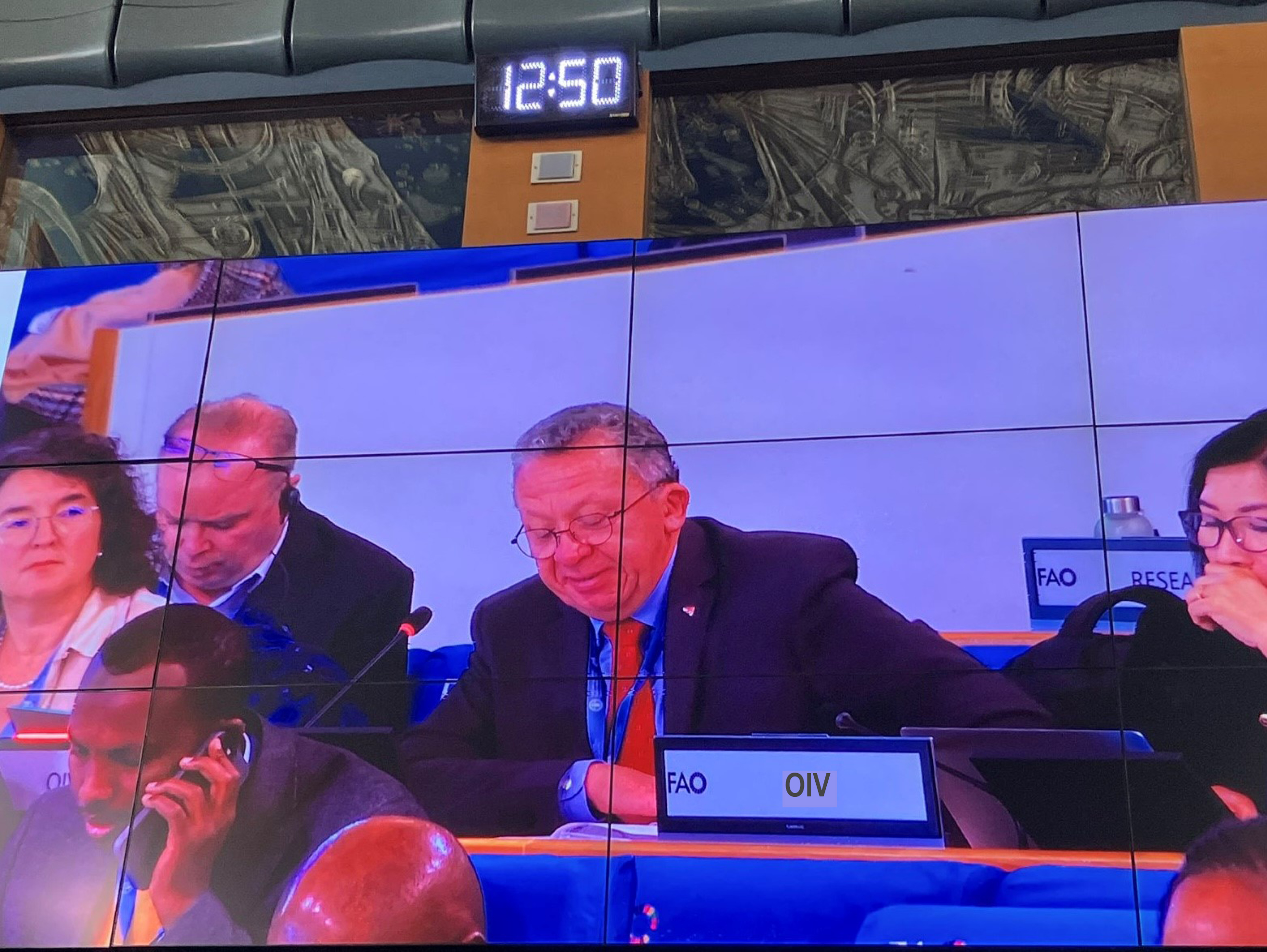En la sede de la Organización de las Naciones Unidas para la Agricultura y la Alimentación (FAO) se firmó una Carta de Intenciones histórica entre la Organización Internacional de la Viña y el Vino (OIV) y el Tratado Internacional sobre los Recursos Fitogenéticos para la Alimentación y la Agricultura (TIRFAA) para la conservación de los recursos fitogenéticos en viticultura.


The ceremony, which took place as a Side Event on the margins of the Tenth Session of the Governing Body (GB-10) of the International Treaty was signed by International Treaty Secretary Kent Nnadozie and Luigi Moio, OIV President.
“The significance of this endorsement lies in the formal commitment by two esteemed intergovernmental bodies, the FAO and the OIV, to champion initiatives geared towards shaping the future of both the viticultural sector and the broader global agricultural industry,” said OIV President Luigi Moio.
“Today's signing goes beyond formality; it represents our strong commitment to collaboratively work towards a sustainable future for global agriculture,” said International Treaty Secretary Nnadozie.” This marks a strategic step in jointly conserving plant genetic resources, promoting biodiversity, and aligning with Sustainable Development Goal 15 to 'halt and reverse land degradation and biodiversity loss.”
The Letter of Intent represents mutual commitment to actively cooperate in political, scientific, and technical terms for the conservation and enhancement of plant genetic resources for food and agriculture, with a focus on sustainability in the viticulture sector.
This collaboration brings together the two organizations in their commitment to the conservation of the biodiversity of the grapevine and Viti vinicultural sector.
Key Initiatives:
This new collaboration will encompass a broad spectrum of activities, including:
- Capacity Building: Encouraging programmes for the development of skills necessary for advanced conservation of plant genetic resources.
- Knowledge Exchange: Actively promoting the exchange of information relevant to the viticulture sector.
- Adoption of International Standards: Advocating for the use of internationally agreed-upon data standards for the documentation of plant genetic resources.
- Resource Provision and Funding: Ensuring necessary resources to support collaborative activities, as well as developing financial initiatives for the progress of shared goals, including those related to Sustainable Development Goal 15, which aims to “protect, restore and promote sustainable use of terrestrial ecosystems, sustainably manage forests, combat desertification, and halt and reverse land degradation and halt biodiversity loss”.
The signing ceremony was preceded by a series of presentations that delved into the rich history of grapes. The sessions covered a spectrum, ranging from the conservation of ancient grapevine germplasm to the innovative development of new varieties resistant to diseases.
Additionally, emphasis was placed on MASI's unwavering commitment to the preservation of bio-viticultural heritage. Among those making presentations were Jean-Claude Ruf, Scientific Director of the OIV; Luigi Bavaresco, Secretary of the OIV Group of Experts; Alessandro Boscaini, the 8th generation of the Boscaini family and owner of MASI Agricola S.p.a.; and Roberta Beber, Agronomist of the Technical Group at MASI Agricola. The Event closed with a wine tasting, featuring wines produced by the Italian Masi vineyard.


In addition, considering the resolution 8/2011 of the International Plant Treaty the Governing Body requesting to foster cooperation with international Organisation such as the OIV, Dr Jean-Claude Ruf, Scientific Director of the OIV has confirmed, in front of all the delegations present at the 10th Governing Body the interest of the OIV to develop and strength a long-term cooperation agreement with the International Plant treaty in the common interests on the conservation and protection of the grapevines genetic resources, in particular.
In this framework, the contracting parties of the treaty have supported a resolution in order to seek practical means and activities to further enhance this cooperation.
